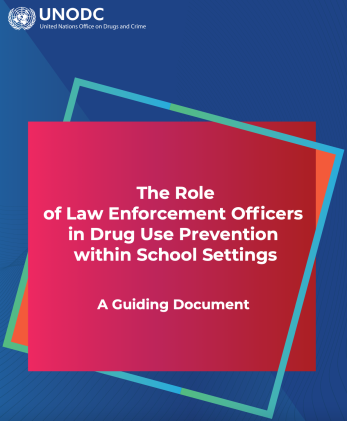
Buscar
A quasi-experimental evaluation of Thinking for a Change: A “real-world” application.
Abstract
Due to the popularity of cognitive behavioural interventions, programs that follow this model are often assumed to be effective. Yet evaluations of specific programs have been slow in coming. The current investigation seeks to...
Criminal conduct and substance abuse treatment: Strategies for self-improvement and change, pathways to responsible living: The provider's guide, 2nd ed.
Abstract
Strategies for Self-Improvement and Change (SSC) provides a standardised, structured and well-defined approach to the treatment of substance abusing judicial clients. The efficacy and effectiveness of SSC depends on developing a...
Thinking for a change 4.0.
About the program:
Thinking for a Change 4.0 (T4C) is an innovative cognitive behavioral change program crafted by experts Jack Bush, Ph.D., Barry Glick, Ph.D., and Juliana Taymans, Ph.D., in partnership with the National Institute of...
Engaging vulnerable populations in drug treatment court: Six month outcomes from a co-occurring disorder wraparound intervention.
Abstract
Objective
Although drug treatment courts (DTCs) have demonstrated positive outcomes, participants with co-occurring mental health and substance use disorders (CODs) are a high-risk group that often struggle with treatment...
The MISSION-criminal justice treatment manual.
In order to effectively implement MISSION and maintain program fidelity, model-specific treatment manuals and consumer workbooks have been created. Each treatment manual is a comprehensive how-to guide for case managers, peer support...
Evidence-based treatment and supervision practices for co-occurring mental and substance use disorders in the criminal justice system.
ABSTRACT
Background:
Over seven million persons in the United States are supervised by the criminal justice system, including many who have co-occurring mental and substance use disorders (CODs). This population is at high risk for...
The Broker of Reality”: A Scoping Review of Moral Reconation Therapy.
ABSTRACT
Purpose
This scoping review aims to identify the evidence-based literature supporting Moral Reconation Therapy (MRT), a cognitive-behavioral treatment program created in 1987 and implemented in correctional-treatment settings...
A meta-analysis of moral reconation therapy.
Abstract
This study reports on a meta-analysis of moral reconation therapy (MRT). Recipients of MRT included adult and juvenile offenders who were in custody or in the community, typically on parole or probation. The study considered...
A randomized controlled trial of moral reconation therapy to reduce risk for criminal recidivism among justice-involved adults in mental health residential treatment.
Abstract
Objective: Moral reconation therapy (MRT) is a cognitive-behavioral intervention to reduce risk for criminal recidivism. Despite being implemented widely in correctional settings, there are no randomized controlled trials of MRT...
Effects of Moral Reconation Therapy upon moral reasoning, life purpose, and recidivism among drug and alcohol offenders.
Abstract
40 incarcerated DWI offenders and 62 drug offenders who were treated with Moral Reconation Therapy were assessed with respect to levels of moral reasoning, their perceived purpose in life, and subsequent recidivism. Analysis...
Meta-analysis of moral reconation therapy recidivism results from probation and parole implementations.
A meta-analysis of nine published outcome studies detailing the effects of Moral Reconation Therapy on recidivism in parolees and probationers is presented. The studies included in the meta-analysis had a total of 2,460 MRT-treated...
A meta-analysis of cognitive-behavioral therapy for alcohol or other drug use disorders: Treatment efficacy by contrast condition.
Abstract
Objective.
This meta-analysis examined 30 randomized controlled trials (32 study sites; 35 study arms) that tested the efficacy of cognitive-behavioral therapy (CBT) for alcohol or other drug use disorders (AUD/SUD). The study...
A meta‐analytic review of the efficacy of psychological treatments for violent offenders in correctional and forensic mental health settings.
Abstract
This meta‐analysis examined whether psychological treatments with adult violent offenders in correctional and forensic mental health settings are effective in preventing community recidivism and institutional (hospital/prison)...
The psychology of criminal conduct.
DESCRIPTION
The Psychology of Criminal Conduct, Seventh Edition, provides a psychological and evidence-informed perspective of criminal behavior that sets it apart from many criminological and mental health explanations of criminal...
Effectiveness of psychological interventions in prison to reduce recidivism: A systematic review and meta-analysis of randomised controlled trials.
Summary
Background
Repeat offending, also known as criminal recidivism, in people released from prison has remained high over many decades. To address this, psychological treatments have been increasingly used in criminal justice settings...
Evidence-based treatment and supervision practices for co-occurring mental and substance use disorders in the criminal justice system.
Abstract
Background: Over seven million persons in the United States are supervised by the criminal justice system, including many who have co-occurring mental and substance use disorders (CODs). This population is at high risk for...
A theoretically informed meta-analysis of the risk for general and violent recidivism for mentally disordered offenders.
Abstract
Mentally disordered offenders (MDOs) pose a significant challenge for forensic and correctional staff charged with managing them in a safe and humane manner. As with non-disordered offenders, it is important to identify the...
Deflection and pre-arrest diversion: A newly emerging field in the United States.
Pre-Arrest Diversion Is the “Handle” on the Front Door of the US Justice System.
Many people can be safely deflected in the community instead of entering the justice system.
Diverting homeless substance users from hospitalization and incarceration: an innovative agency collaboration.
ABSTRACT
In Washington State, U.S., 29 of every 10,000 individuals were homeless in 2019. It has been estimated that over 80% of chronically homeless individuals have experienced substance use disorders. Snohomish County Diversion Center...
A scoping review of community-based post-opioid overdose intervention programs: implications of program structure and outcomes.
Abstract
Background:
An emergent intervention to address the opioid epidemic is the use of multidisciplinary outreach teams which connect an individual in the community to healthcare resources after the experience of an opioid overdose...
Contribuye al Intercambio de Conocimientos: Miembros de ISSUP pueden publicar artículos en el Intercambio de Conocimientos – Entra o hazte miembro

